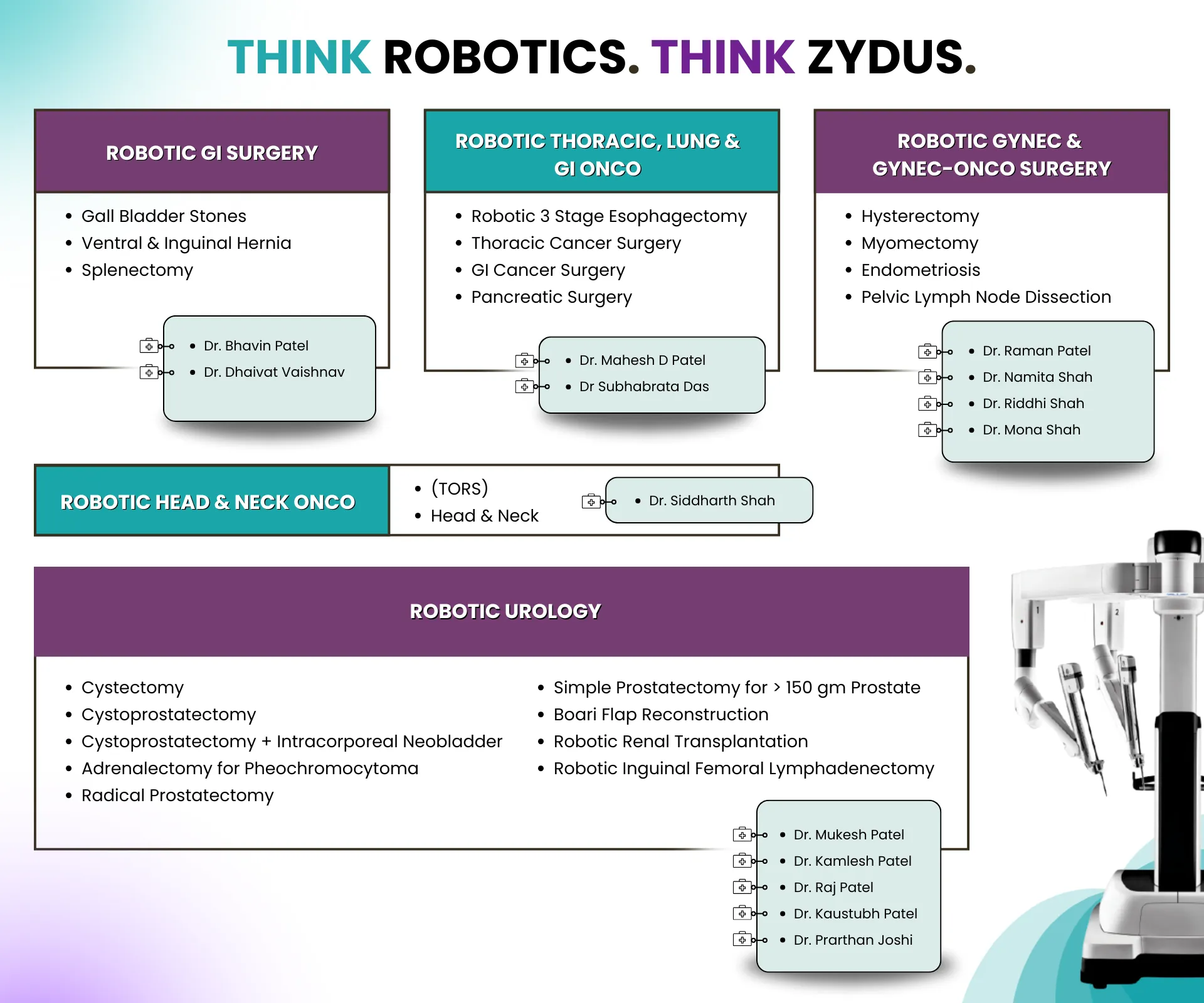From Immunity to Autoimmunity: Understanding Allergies, Deficiencies & Rheumatic Diseases
The human immune system is an intricate and powerful defense network that shields the body from infections and harmful invaders. Immunology, the study of this remarkable system, not only helps us understand how our body fights off disease but also guides us in diagnosing and managing conditions where this system goes awry. These conditions include immunodeficiencies, allergies, and rheumatic diseases.
Here, we explore these interconnected topics to give you a structured understanding of the immune system and its disorders, while also highlighting the related specialized services available at Zydus Hospital, Ahmedabad.
What is Immunology?
Immunology is a branch of biomedical science that studies the body's immune system. The immune system is the body's defense against infections and other harmful invaders. It recognizes and responds to antigens, which are substances that the body sees as foreign or dangerous. Immunology also deals with immune system malfunction, such as allergies, hypersensitivities, immune deficiency, transplant rejection, and autoimmune diseases. Clinical immunology focuses on diagnosing and managing these immune system disorders.
How Immunodeficiencies Happen?
Immunodeficiency disorders disrupt the body's ability to defend itself against bacteria, viruses, and parasites. They occur when the immune system is weakened or absent, making the body more susceptible to infections. These disorders can be primary immunodeficiency, meaning a person is born with a weakened immune system due to genetic defects, or secondary immunodeficiency, developing later in life due to factors like infections like HIV/AIDS, medical treatments like chemotherapy, radiation, malnutrition, or certain chronic diseases like diabetes, cancer. In primary immunodeficiency, parts of the immune system may be missing or not functioning correctly, such as deficiencies in B cells, which produce antibodies, or T cells. Secondary immunodeficiency happens when external factors compromise the immune system's ability to function effectively. Aging can also weaken the immune system.
How Allergies Happen?
Allergies, also known as allergic diseases or hypersensitivities, are conditions caused by the immune system overreacting to substances in the environment that are usually harmless to most people, known as environmental allergens. When an allergic individual is first exposed to an allergen, their body may produce IgE antibodies specific to that allergen. This process is called sensitization. These IgE antibodies attach to mast cells in the body. Upon subsequent exposure to the same allergen, the allergen binds to the IgE antibodies on mast cells, causing them to release chemicals like histamine release and other mediators, which leads to the symptoms of allergic reactions. Allergic reactions can occur on the skin, in the airways, mucous membranes, and the digestive tract.
How Rheumatic Diseases Happen?
Rheumatic diseases, also known as musculoskeletal diseases, are a broad group of conditions affecting the joints, muscles, bones, and connective tissues. Rheumatology is the branch of medicine focused on diagnosing and managing these disorders. Many rheumatic diseases are characterized by joint inflammation, and a significant number are autoimmune disorders. In autoimmune rheumatic diseases, the body's immune system mistakenly attacks its own healthy tissues, leading to inflammation, pain, and potential damage. Other rheumatic diseases, like osteoarthritis, are examples of degenerative joint disease, resulting from wear and tear on the joints over time. The exact causes of many rheumatic diseases are not fully understood but are believed to involve a combination of genetic and environmental factors. Some rheumatic conditions can develop after an injury that doesn't heal properly.
Common Disorders and Symptoms
A. Immunodeficiencies
Immunodeficiency disorders occur when the immune system doesn't work as it should, making individuals more prone to infections. These can be primary immunodeficiency (present from birth) or secondary immunodeficiency (acquired later in life).
1. Common Symptoms:
Frequent infections, persistent, or unusual infections that are difficult to treat.
Infections that are more severe or take a long time to clear up.
Opportunistic infections that typically don't affect people with healthy immune systems.
Recurrent fevers without an obvious cause.
Chronic fatigue or lack of energy.
Digestive issues like chronic diarrhea, abdominal pain, nausea, or loss of appetite.
Swollen glands (lymph nodes) that remain enlarged or appear without a clear reason.
Delayed growth and development in children.
Blood disorders, such as low platelet count or anemia.
Inflammation and infection of internal organs.
Other signs your immune system is weak may include repeated need for antibiotics or unexplained infections.
2. Specific Immunodeficiency Examples:
Common Variable Immunodeficiency (CVID): Typically diagnosed in adulthood. Characterized by low levels of antibodies. Symptoms: frequent infections, chronic rhinitis, enlarged lymph nodes, unintended weight loss, joint pain.
Phagocyte Defects (e.g., Chronic Granulomatous Disease (CGD)): Diagnosed in childhood. Symptoms: recurrent respiratory infections, severe infections, abscesses, swollen lymph nodes.
B cell deficiency (e.g., Selective IgA Deficiency, X-linked Agammaglobulinemia): Symptoms: respiratory and gastrointestinal infections. X-linked Agammaglobulinemia starts in infancy.
Severe Combined Immunodeficiency (SCID): Present from birth. Symptoms: severe infections, poor growth, and development due to a weakened immune system.
These examples highlight the variety of immune system disorders and how early identification is key in managing both primary immunodeficiency and secondary immunodeficiency conditions.
B. Allergic Disorders
Allergic disorders are conditions where the immune system overreaction occurs in response to harmless substances called environmental allergens. These hypersensitive immune responses are categorized under hypersensitivity reactions, commonly known as types of allergies.
1. Common Symptoms:
Sneezing, nasal congestion, allergy, itchy eyes/nose/throat, these are common respiratory allergy symptoms.
Hives, atopic dermatitis, urticaria and angioedema are examples of allergic skin conditions.
Wheezing, allergy-induced asthma, shortness of breath typical in asthma and allergies.
Gastrointestinal symptoms are often seen in food allergies, highlighting the difference between food allergy and intolerance.
Anaphylaxis (life-threatening) includes anaphylaxis symptoms like rapid heartbeat, difficulty breathing, and is among the key signs of anaphylactic shock.
2. Specific Allergic Disorders:
Allergic Rhinitis: Seasonal or perennial. Symptoms: sneezing, nasal congestion allergy, fatigue. Learn more about what causes allergic rhinitis.
Rhinosinusitis: Inflammation of the sinuses, often referred to as allergic sinusitis when caused by allergens.
Conjunctivitis (Allergic): Also known as allergic conjunctivitis, causing itchy, red, watery eyes.
Asthma (Allergic): Often referred to as allergy-induced asthma, involving coughing, wheezing, and chest tightness.
ABPA (Allergic Bronchopulmonary Aspergillosis): A fungal allergic lung reaction, scientifically called allergic bronchopulmonary aspergillosis (ABPA).
EGPA (Churg-Strauss Syndrome): Known medically as eosinophilic granulomatosis, includes asthma and allergies, sinus problems, nerve pain, and skin rashes.
Food Allergies: Common triggers include nuts, dairy, and shellfish. Understand the difference between food allergy and intolerance, and food intolerance vs allergy to better identify digestive symptoms.
Drug Allergies: Causes include antibiotics and NSAIDs.
Urticaria and Angioedema: Presents with histamine release, leading to welts and swelling.
Anaphylaxis: A severe histamine response affecting multiple body systems. It is critical to recognize anaphylaxis symptoms and know when to seek emergency care.
Insect Sting Allergies: A serious form of insect sting allergy may cause signs of anaphylactic shock.
Mast Cell Activation Syndromes: Result in exaggerated histamine response and symptoms mimicking other allergic conditions.
Atopic Dermatitis/Eczema: A Chronic skin condition, triggered by allergens or irritants. Learn what triggers eczema flare-ups to manage this effectively.
Early allergen testing can help determine triggers and distinguish between different types of allergies, allowing better management of symptoms of allergic reactions.
C. Rheumatic and Musculoskeletal (MSK) Disorders
This category includes a broad range of rheumatic disorders and musculoskeletal disorders, often marked by inflammation and immune response. Many fall under inflammatory joint diseases and connective tissue diseases, especially those with autoimmune origins.
1. Arthritides:
Rheumatoid Arthritis (RA): Symmetrical joint pain, stiffness, fatigue, nodules. Common rheumatoid arthritis symptoms include swollen joints in fingers and fatigue and joint pain.
Ankylosing Spondylitis (AS): A form of autoimmune arthritis primarily affecting the spine. Known for spinal pain, stiffness, and is a key example of arthritis in young adults.
Psoriatic Arthritis (PsA): Involves joint pain causes such as nail changes and psoriasis skin plaques. Often includes dactylitis and enthesitis.
Reactive Arthritis: Triggered by infection, often referred to when discussing reactive arthritis causes. Joint pain is accompanied by eye or urinary symptoms.
IBD-associated Arthritis: Large joints affected alongside bowel flares, another form of autoimmune rheumatic diseases.
Gout: Known for acute gout pain, especially in the big toe, along with swelling and redness.
Osteoarthritis (OA): A degenerative joint condition needing proper Osteoarthritis Treatment. Presents with pain and stiffness in the knees, hips, and hands — common chronic joint disorders.
2. Autoimmune and Inflammatory Rheumatic Diseases/CTDs:
Lupus (SLE): Also called systemic lupus erythematosus, presents with butterfly rash lupus, joint pain, and pain and fatigue.
Sjögren's Syndrome: Causes dry eyes/mouth, fatigue and joint pain.
Systemic Sclerosis (Scleroderma): Characterized by scleroderma symptoms like Raynaud’s phenomenon, skin tightening, and internal organ involvement.
Myositis: Inflammatory muscle disease marked by weakness, fatigue, and skin rash. A form of connective tissue diseases.
Antiphospholipid Syndrome (APLA): Causes blood clots, miscarriages, and sometimes stroke. Falls under autoimmune rheumatic diseases.
3. Vasculitis:
ANCA-associated Vasculitis: A form of vasculitis symptoms with fatigue, weight loss, and kidney/lung issues.
IgA Vasculitis: Rash, joint pain, abdominal issues; common in children.
Takayasu Arteritis: Affects large arteries; arm/leg pain and high BP. A key example of arthritis in women, especially under age 40.
Behçet's Disease: Notable for mouth/genital sores and eye inflammation.
Kawasaki Disease: A pediatric illness with fever, red eyes/lips, and swollen nodes.
4. Soft Tissue Rheumatism:
Fibromyalgia: Widespread fibromyalgia pain, fatigue, and sleep issues, often accompanied by pain and fatigue.
Myofascial Pain Syndrome: Marked by muscle pain and trigger point pain. Management may involve myofascial pain syndrome treatment.
Joint Hypermobility Syndrome: Involves hypermobile joints symptoms like dislocations and chronic pain, affecting overall joint function.
When to See a Specialist?
Knowing when to see an immunologist, rheumatologist, or allergist can make a significant difference in managing chronic or undiagnosed health concerns related to the immune system, allergies, or joints. Here's a breakdown of scenarios that warrant specialist care.
A. Immunologist / Allergist:
You should consider booking a rheumatologist consultation with an allergy specialist in Ahmedabad or an immunologist vs allergist expert if you experience:
Persistent allergy symptoms treatment isn’t working, or you’re dealing with chronic sinus infections due to allergies that interrupt your daily life.
Ongoing asthma symptoms in adults, such as wheezing, coughing after exercise, or waking up breathless at night.
A severe allergic reaction or multiple severe allergic reaction signs, such as hives, tongue or facial swelling, or trouble breathing—these are signs you need an allergist.
Frequent infections like colds or flu, especially if they’re hard to recover from, these may indicate immunodeficiency symptoms.
A known or suspected family history of immunodeficiency, which could increase your risk for complications.
You’re searching for an allergy specialist near me or the best immunologist in Ahmedabad to help manage allergy-related disorders or unexplained illnesses.
You’ve had repeated infections or autoimmune symptoms in women, such as fatigue, rash, or joint swelling.
Confusion about when to see an allergist or when to see an immunologist for your overlapping symptoms.
Diagnosed or suspected symptoms of autoimmune disease that require specialist evaluation and immune testing.
B. Rheumatologist:
Consulting a rheumatologist in Ahmedabad or a joint pain specialist may be necessary in the following cases:
Unexplained chronic joint/muscle pain, stiffness, or soreness that persists for weeks or months.
Morning stiffness and arthritis symptoms that last for over 30 minutes and interfere with mobility.
Joint stiffness, swelling, or redness, particularly if you notice chronic fatigue and joint pain together.
Skin issues like skin rashes and autoimmune diseases like lupus, psoriasis that coincide with joint discomfort.
Blurred vision, light sensitivity, or red eyes combined with inflammatory blood test results, like positive ANA or rheumatoid factor.
If you’ve experienced symptoms worsening rapidly over a short period or have concerns about autoimmune disease doctor support.
You’re unsure when to see a rheumatologist or whether a rheumatologist for joint swelling is the right next step.
Early detection and intervention can greatly improve long-term outcomes in both allergic and autoimmune conditions. Always consult with a trusted specialist when symptoms persist or escalate.
What Zydus Hospital Ahmedabad Offers?
A. Immunodeficiency Services at Zydus Hospital Ahmedabad:
Diagnosis:
Zydus Hospital Ahmedabad, a leading immunology hospital in Ahmedabad, offers comprehensive primary immunodeficiency diagnosis Ahmedabad with advanced diagnostic testing for immunodeficiencies to evaluate different components of the immune system. This includes immunoglobulin testing to measure antibody levels (IgG, IgA, IgM, IgE), assessment of T cell and B cell functions, phagocyte function tests, and genetic testing for immunodeficiency to identify underlying genetic defects in primary immunodeficiencies. Their NABL-accredited immunology lab provides state-of-the-art autoimmune profiles and immunohematology services. Flow cytometry is also utilized for the accurate identification of various immunodeficiency disorders.
Treatment:
Immunodeficiency treatment in Ahmedabad at Zydus Hospital Ahmedabad is tailored to the specific disorder. For patients with antibody deficiencies such as CVID treatment and X-linked agammaglobulinemia treatment, therapies often include IVIG therapy or subcutaneous immunoglobulin to replace missing antibodies and prevent infections. Prophylactic antibiotics and antifungals may also be prescribed to reduce infection risk. The hospital features a cutting-edge Bone Marrow Transplant for SCID unit, providing hematopoietic stem cell transplantation as a potentially curative option for severe primary immunodeficiency disorders like SCID. Expertise in transplant immunology further supports successful transplantation outcomes. Management of secondary immunodeficiencies focuses on addressing the root cause of immune impairment.
This comprehensive approach reflects the high standard of Zydus Hospital immunodeficiency care and the quality of its immunology lab in Ahmedabad.
B. Allergy Services at Zydus Hospital, Ahmedabad:
Diagnosis:
Zydus Hospital Ahmedabad provides a comprehensive range of allergy diagnosis services, including allergy testing in Zydus Hospital to identify specific allergy triggers. This includes the skin prick test, a minimally invasive method where small amounts of allergens are applied to the skin to check for reactions. For certain allergens, an intradermal allergy test may be performed by injecting a small amount of allergen under the skin. To detect contact allergies, a patch test for allergies is used, where allergens are applied to patches placed on the skin for a period of time. The hospital also offers advanced Molecular Allergy Testing (Component Resolved Diagnostics - CRDs), which can detect antibodies to over 300 allergenic molecules in a single blood test, enhancing diagnostic precision and understanding of cross-reactivity. An IgE blood test for allergies serves as an alternative or complementary diagnostic tool. Additionally, allergy panel testing is available, screening for a group of common allergens.
Additional Diagnostic Tools:
Depending on the allergy type, Zydus Hospital uses specialized procedures such as rhinoscopy allergy diagnosis to visualize nasal passages, bronchoscopy for allergies to examine lung airways, Pulmonary Function Test (PFT) to assess lung function, FeNO test for asthma to assist in diagnosis and management, and oscillometry lung function test as another method for lung assessment.
Treatment:
Zydus Hospital provides comprehensive allergy treatment, including allergen immunotherapy options such as allergy shots (subcutaneous immunotherapy - SCIT), which gradually desensitize the immune system with increasing allergen doses. Sublingual immunotherapy (SLIT), involving allergen tablets or drops under the tongue, is also offered for select allergies. For severe allergic conditions, asthma treatment with biologics and chronic urticaria treatment are available, targeting specific immune pathways involved in allergic inflammation. The department ensures thorough allergy medication management using antihistamines and corticosteroids for allergies, along with allergen avoidance strategies tailored to each patient. Patients receive a personalized allergy action plan to manage reactions effectively, including anaphylaxis treatment protocols and epinephrine auto-injector prescription with proper education on usage.
C. Rheumatology Services at Zydus Hospital, Ahmedabad:
Investigations:
Zydus Hospital Ahmedabad provides comprehensive rheumatology services and rheumatology investigations for accurate diagnosis and management. Patients benefit from evaluation by an experienced rheumatologist in Zydus Hospital, supported by extensive rheumatology lab tests including autoantibody testing such as rheumatoid factor test and anti-CCP test for arthritis diagnosis. Inflammatory markers like ESR and CRP tests for inflammation are routinely measured to monitor disease activity. Advanced rheumatology imaging tests are utilized, including X-rays, musculoskeletal ultrasound (MSK-US) to assess joints, tendons, and soft tissues in real-time, Dual-energy CT scan for gout, and PET-CT for inflammatory conditions. When needed, joint aspiration (arthrocentesis) is performed to analyze synovial fluid for further insights. This comprehensive approach positions Zydus Hospital as a leading rheumatology center in Gujarat, specializing in autoimmune disease diagnosis.
Management:
The hospital offers holistic rheumatology diagnosis and treatment, with tailored strategies for joint pain treatment and inflammatory arthritis treatment. Pharmacological options include NSAIDs for joint pain relief, corticosteroids (oral and injected), and DMARDs for rheumatoid arthritis to slow disease progression. For targeted control of inflammation, biologics for rheumatoid arthritis and other biologics for autoimmune disorders are prescribed, alongside advanced targeted therapy for arthritis. Localized relief is provided through corticosteroid joint injections and hyaluronic acid joint injection for affected joints. Complementary physical therapy for arthritis and occupational therapy help improve joint function and mobility. Surgical referrals are made when necessary, with Zydus Hospital offering a specialized one day knee replacement program designed for faster recovery in osteoarthritis patients.
Final Thoughts
Understanding your immune system is the first step toward living healthier, stronger, and symptom-free. Whether it’s managing recurring allergies, uncovering the cause of frequent infections, or seeking relief from joint pain, early awareness can lead to effective solutions.
Zydus Best hospital in ahmedabad, we believe in proactive, personalized care. With advanced diagnostics, expert specialists, and a commitment to holistic healing, we empower every patient with clarity and confidence.





